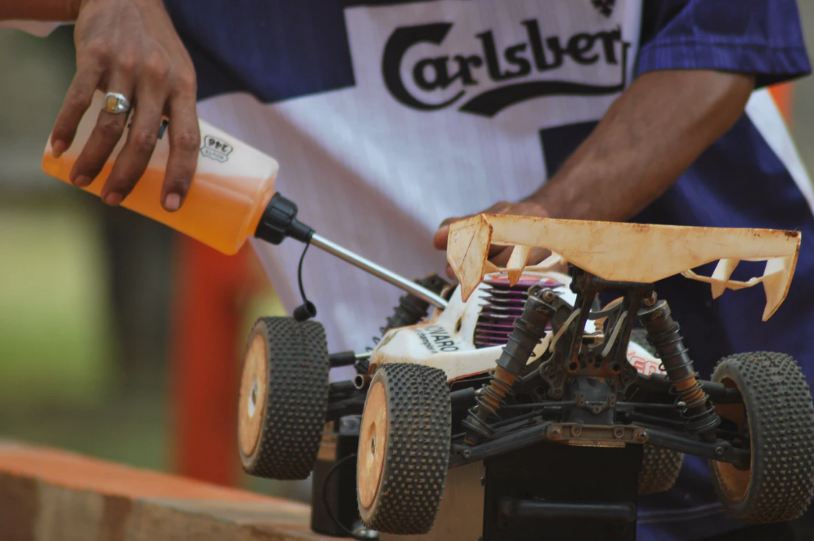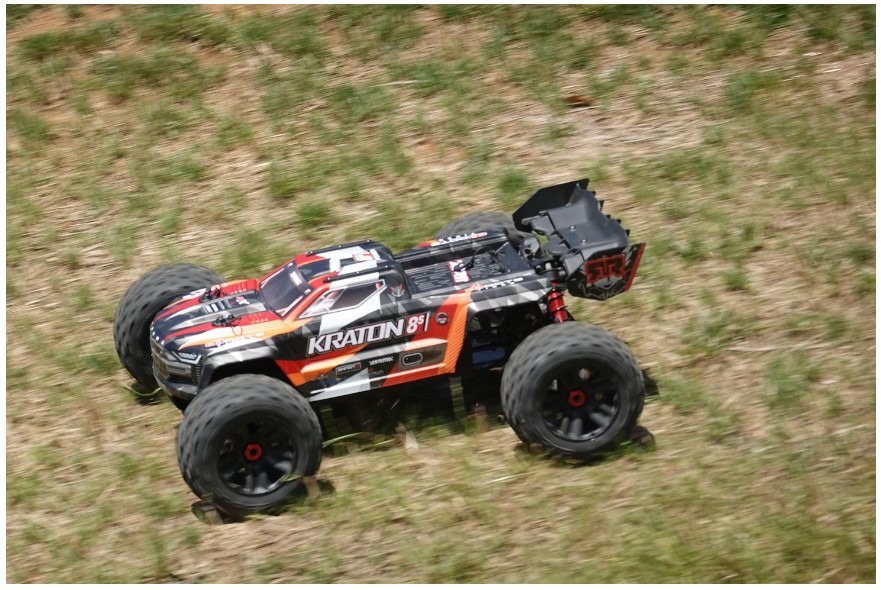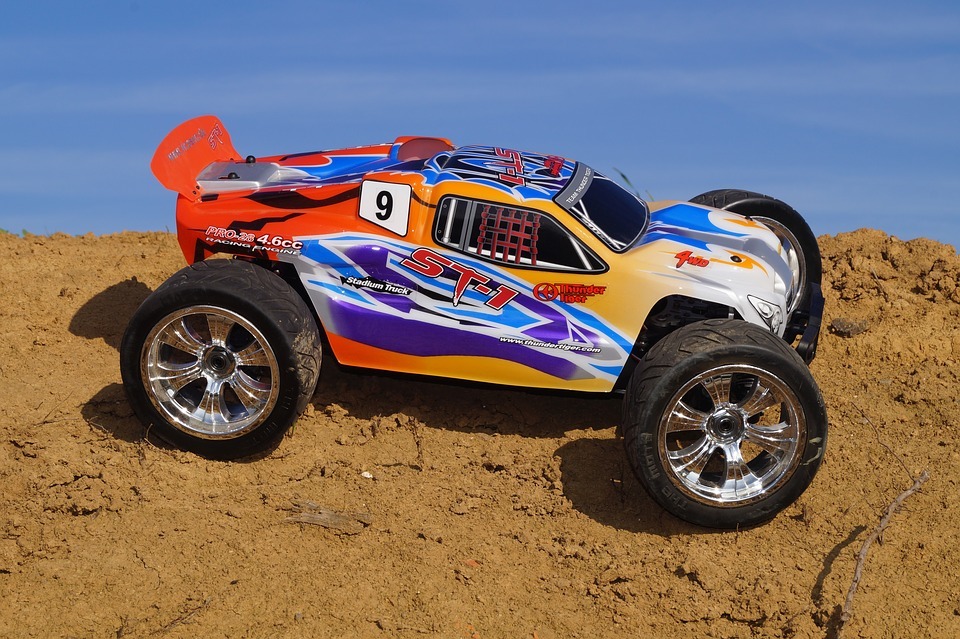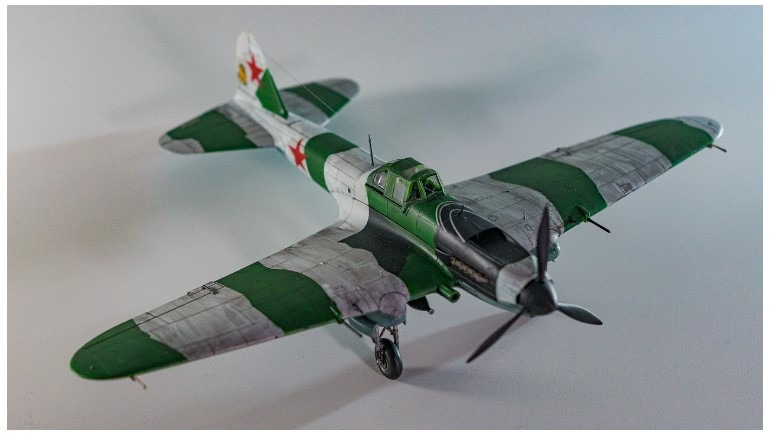What Are Hobby Grade Remote Control Cars?
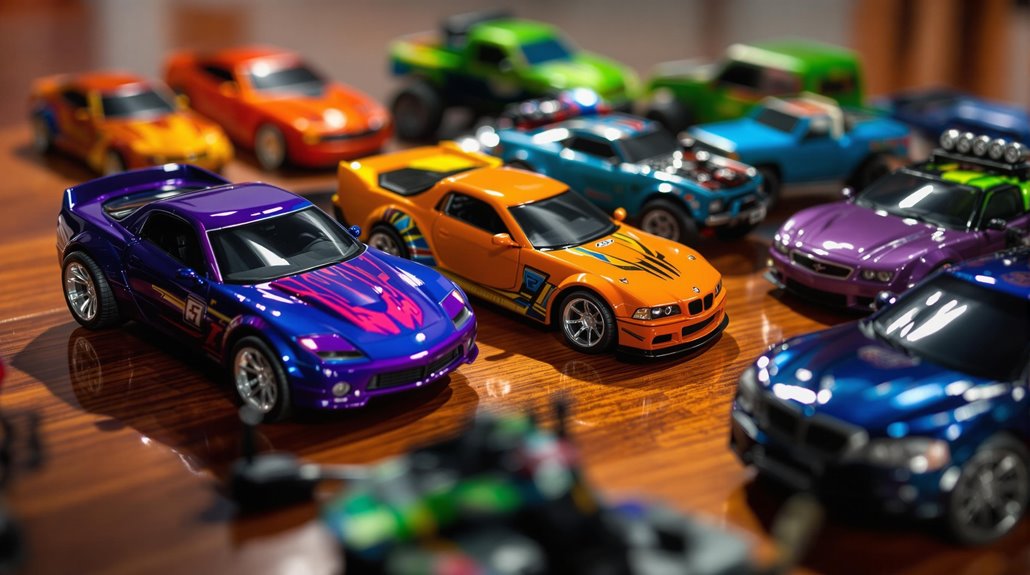
Hobby-grade remote control cars are high-performance vehicles designed for enthusiasts who crave more than a simple toy. They're built with durable materials like aluminum and carbon fiber, allowing them to withstand tough conditions. Equipped with powerful brushless motors, these cars can zoom past 30 mph, with some reaching up to 50 mph. You'll find diverse types, such as on-road speedsters, off-road conquerors, and drift-specialized models. They offer extensive customization options and typically, maintenance involves routine checks and possible upgrades. If you're passionate about speed and customization, these cars offer a thrilling experience. There's a lot more to investigate beyond this introduction.
Understanding Hobby Grade RC Cars
When diving into the world of hobby grade RC cars, you'll find a domain where performance and customization take center stage. These aren't your typical toy-grade models; they're engineered for serious enthusiasts who crave speed and precision. With high-quality components, hobby grade RC cars can reach exhilarating speeds of over 30 mph, with some models even hitting 50 mph, thanks to the powerful brushless motors that drive them. This kind of speed is a far cry from the modest 5-10 mph of toy grades.
Crafted from durable materials like aluminum and carbon fiber, these cars are built to withstand crashes and rough terrain, outlasting their plastic toy-grade counterparts. This durability doesn't just mean they last longer; it also means you can take them apart, upgrade, and repair them with readily available spare parts. Regular maintenance becomes a part of the hobby, as it allows you to improve performance and longevity. Additionally, many hobby grade RC cars are designed with advanced features and specifications that enhance their performance and user experience.
In essence, hobby grade RC cars offer a thrilling blend of speed, durability, and endless possibilities for customization. Regardless of whether you're racing competitively or just enjoying the thrill of a high-speed chase, these cars deliver a unique and engaging experience.
Target Audience and Enthusiasts
The world of hobby-grade remote control cars is a lively community, attracting serious enthusiasts and adults who relish the advanced features and endless customization options these machines offer. As a hobby-grade RC enthusiast, you're likely drawn to the thrill of competitive racing and the camaraderie found at organized events. Regardless of whether you're maneuvering tight on-road circuits or tackling rugged off-road trails, there's a vehicle type and scale tailored to your preferences.
The market for hobby-grade RCs is booming, especially among adults seeking that adrenaline rush. Clubs and racing competitions are thriving, providing ample opportunities for engagement and excitement. You might find yourself spending hours fine-tuning your car for optimum performance or participating in heated races where every second counts.
Being part of this community offers emotional and social rewards:
- Connection: Online forums and communities help you connect with like-minded individuals, sharing insights and stories.
- Achievement: The satisfaction of upgrading and maintaining your RC car improves your skills and pride.
- Excitement: The rush of competitive racing and events keeps your passion alive.
Moreover, RC cars provide a unique blend of outdoor recreation that allows enthusiasts to enjoy nature while indulging in their hobby. Dive into this dynamic world and experience the unique joy of being a hobby-grade RC enthusiast!
Key Features and Performance
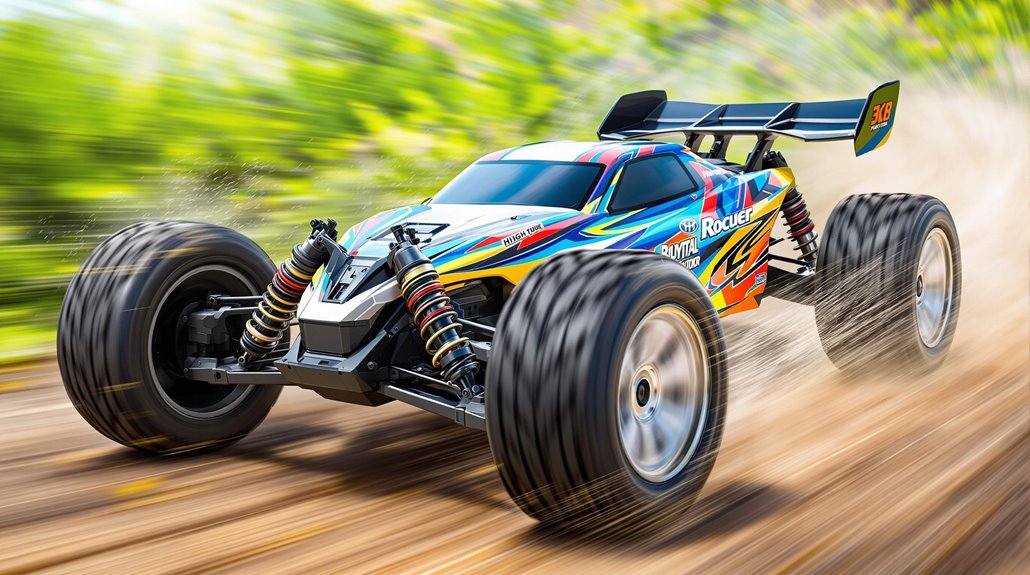
Many hobby-grade remote control cars stand out due to their impressive speed and robust build. With peak speeds exceeding 30 mph, and some models even reaching 50 mph, they clearly surpass toy-grade cars. These thrilling speeds are achievable thanks to advanced brushless motors and 3S LiPo batteries. Unlike toy-grade models, which usually max out at slower speeds, hobby-grade cars offer exhilarating performance.
The performance doesn't stop at speed. Hobby-grade RC cars are crafted from high-quality materials like aluminum and carbon fiber, giving them a clear edge over toy-grade cars made mostly of plastic. This choice of materials means they're built to withstand the rigors of racing and off-road adventures, offering resistance to wear and tear that toy-grade models simply can't match.
Handling and versatility are exceptional, thanks to advanced suspension systems, allowing you to tackle a variety of terrains with ease. While toy-grade cars are limited to flat surfaces, hobby-grade models let you investigate more challenging paths. And regarding battery life, expect 20 to 30 minutes per charge, considerably longer than the under-15-minute lifespan typical of toy-grade options. Plus, hobby-grade cars allow for extensive customization, letting you fine-tune and improve performance. Additionally, many hobby-grade models come equipped with high-quality motors, ensuring better acceleration and speed compared to their toy-grade counterparts.
Material Quality and Durability
In the domain of hobby-grade remote control cars, material quality and durability stand as defining features that set these models apart from their toy-grade counterparts. You'll find that hobby-grade RC cars are built with superior materials like aluminum, carbon fiber, and high-grade plastics. These materials give them increased strength and impact resistance, allowing them to withstand the roughest terrains and crashes without frequent replacements. The robust design guarantees that even after a collision, you won't need to rush out for spare parts as often.
Consider what makes these cars truly exceptional:
- Full-Metal Drivetrains: These improve durability and acceleration, making your car ready for the most demanding tracks.
- Reinforced Components: Built to endure tough handling, these parts secure your car keeps going when others might falter.
- Waterproof Features: With these, rain or puddles won't stop your RC car adventures, adding versatility and extending its lifespan.
With the right maintenance, these cars last far longer than toy-grade models, showcasing their superior build quality. Additionally, hobby-grade RC cars often come with high-quality parts that contribute to a more enjoyable and reliable experience. When you're investing in a hobby-grade RC car, you're getting reliability, performance, and longevity all in one.
Maintenance and Upgrades
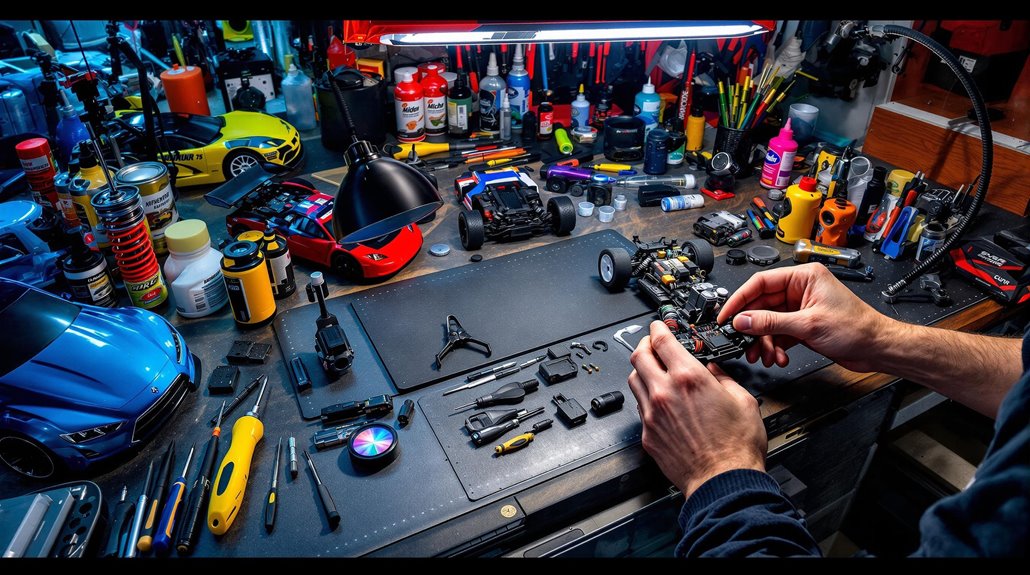
When delving into the world of hobby-grade remote control cars, it's crucial to adopt regular maintenance and investigate potential upgrades to keep your vehicle at peak performance. Regular maintenance guarantees that your RC car runs smoothly and lasts longer. Start by routinely checking components like spur gears for wear and tear. Cleaning the drivetrain and replacing worn tires are simple tasks that can greatly improve performance. Adjusting the suspension settings can also help maintain peak handling.
Hobby-grade models typically offer a wide range of upgrade parts, allowing you to tailor your car to your liking. Consider upgrading to performance parts like brushless motors for more speed, or improved battery packs for longer run times. Advanced suspension systems can provide better control and stability, especially on rough terrains. For example, upgrading to a Velineon brushless motor can significantly enhance your car's speed and responsiveness.
You'll find that these cars often come with detailed instruction manuals, which can guide you through maintenance and upgrades. Furthermore, online forums are a wealth of advice and experiences from other enthusiasts. Regardless of if you're troubleshooting or considering a new modification, these resources are invaluable. By keeping up with maintenance and exploring upgrades, you'll guarantee your RC car remains a thrilling and reliable companion.
Cost and Investment Value
Hobby-grade remote control cars can be a substantial investment, but they're worth every penny for enthusiasts. With prices ranging from £100 to over £1,000, you're not just buying a toy—you're investing in a hobby that promises quality and performance. Entry-level models start at around £100, making them perfect for beginners. However, as you explore deeper into the hobby, you'll find that higher-end models offer advanced features and materials that greatly improve both performance and longevity.
While the initial cost is higher than toy-grade alternatives, hobby-grade RC cars are often more cost-effective in the long run. Their durability means you'll spend less on replacements, and the wide availability of spare parts guarantees your car remains in top condition. Furthermore, the growing popularity of these cars has resulted in a competitive market, offering better value and quality for your investment.
Many hobby-grade RC cars come with different power sources that enhance their performance and reliability, making them suitable for various environments.
Consider these emotional benefits of investing in hobby-grade RC cars:
- Pride in Ownership: Feel the excitement of owning a high-performance machine.
- Long-Term Enjoyment: Experience the satisfaction of a durable, long-lasting product.
- Community Connection: Join a passionate group of like-minded enthusiasts.
Investing in a hobby-grade RC car isn't just a purchase—it's a rewarding experience.
Community and Market Trends
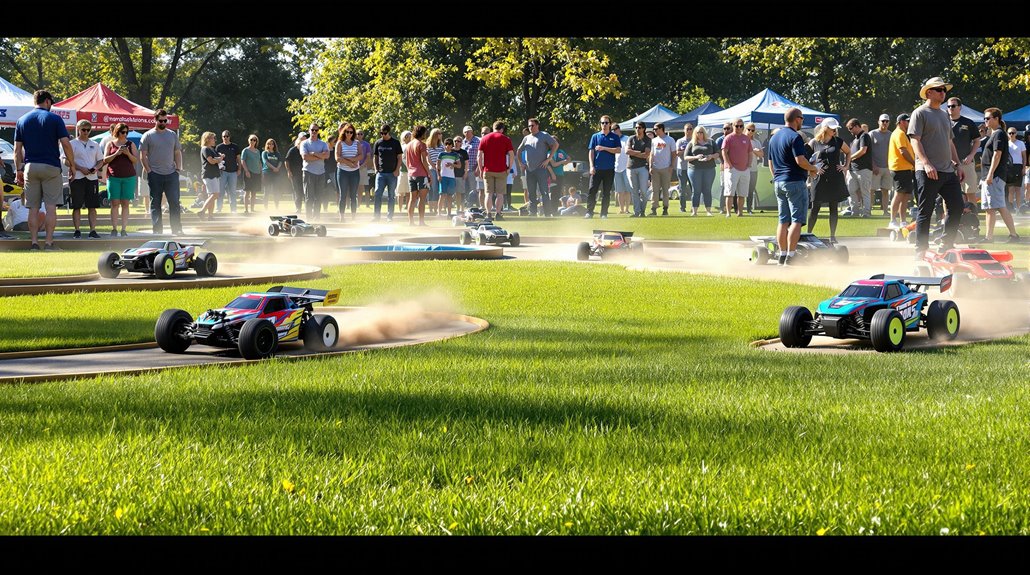
Over the past few years, the market for hobby-grade remote control cars has grown considerably, fueled by surging interest from adult enthusiasts. This growth is partly driven by organized racing events and lively community engagement. You'll find that online forums and social media platforms are buzzing with activity, offering invaluable resources where hobbyists exchange tips, share experiences, and support each other. Regardless of whether you're a beginner or a seasoned pro, these platforms are a goldmine of information.
The hobby-grade RC car scene is diverse, with a wide array of vehicle types and scales that appeal to people of all generations and genders. Brands like Arrma and Team Associated are renowned for their high-performance models, while brands like Redcat have stepped up their game, making them more appealing to newcomers. This inclusivity has encouraged participation across eras, fostering a rich community spirit. Additionally, many top brands like Traxxas are recognized for their fast RC cars and buggies, attracting a broad audience.
As a hobbyist, you'll appreciate how innovations in technology have made these RC cars more robust and durable, enhancing their appeal. The combination of community support, diverse options, and technological advancements has solidified hobby-grade remote control cars as a growing trend in the market.
Technological Advancements
In recent years, technological advancements have transformed the world of hobby-grade remote control cars, making them more exciting and accessible than ever. Modern RC cars now use 2.4GHz technology, letting up to 85 vehicles race alongside each other without interference, enhancing your racing experiences to new heights. Imagine the thrill of competing with dozens of friends, each car operating smoothly, thanks to the advanced Frequency Hopping Spread Spectrum (FHSS) technology that automatically scans for open channels.
With hobby-grade models now featuring brushless motors, you'll notice a significant increase in performance and efficiency. These motors deliver higher speeds and longer run times than traditional brushed motors, guaranteeing your RC car doesn't just look fast—it is fast. Coupled with high-capacity LiPo batteries, some models can exceed speeds of 50 mph, providing exhilarating performance.
Consider these three innovations that make hobby-grade RC cars a must-have:
- Brushless Motors: Increased efficiency and speed.
- 2.4GHz Technology: Uninterrupted fun with numerous cars.
- LiPo Batteries: Speeds beyond 50 mph.
Sophisticated suspension systems and durable materials like aluminum and carbon fiber assure your car handles beautifully and withstands the rigors of high-speed play. Furthermore, the evolution of electric models has paved the way for a broader range of enthusiasts to engage with RC cars, ensuring a diverse community and more options for hobbyists.
Types and Models Available
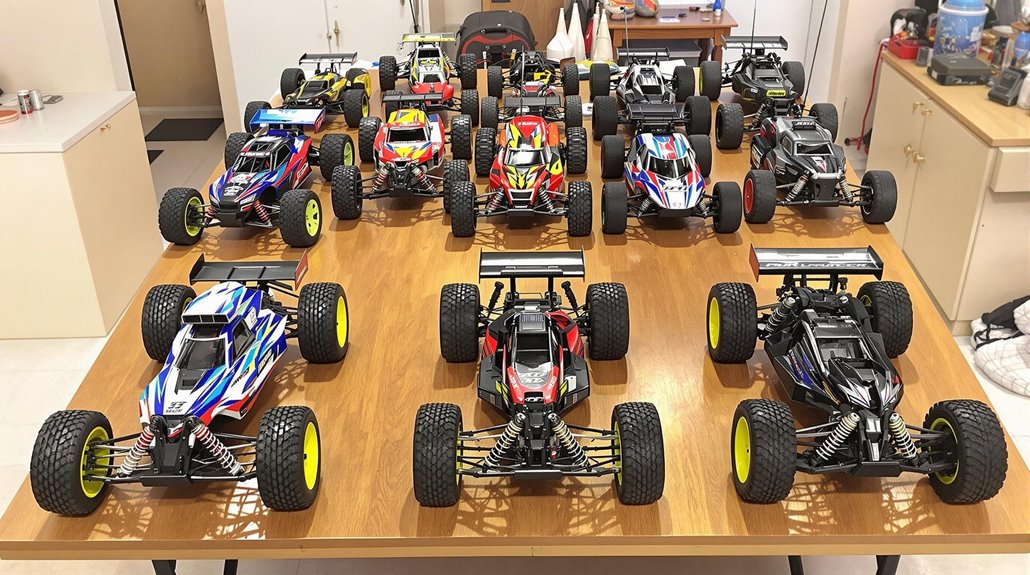
Exploration into the distinct types and models of remote control cars reveals a thrilling world of diversity and customization. Hobby grade remote control cars are categorized into several types, each tailored to specific terrains and experiences. You'll find On Road cars, perfect for smooth surfaces and racing, while Off Road vehicles, like trucks and buggies, tackle rugged terrains with ease. If realism is your thing, scale vehicles offer an authentic design and performance, bringing your miniature driving fantasies to life.
Electric RC cars come in different scales, typically ranging from 1:10 to 1:18. This range provides flexibility, letting you choose a model based on your size preference and desired performance capabilities. Hobby grade models often require assembly, giving you a hands-on experience that improves your understanding of vehicle mechanics. This process also opens the door to endless customization and upgrades, allowing your creativity to flourish. Additionally, many models incorporate high-quality parts to ensure outstanding performance and durability.
For those keen to jump right into the action, many models are available as Ready To Run (RTR) vehicles. These come pre-assembled and include all necessary components. High-performance hobby-grade cars frequently feature advanced technology, such as brushless motors, allowing for remarkable speeds and superior handling.
Ready To Run vs. Kits
When diving into the world of hobby-grade remote control cars, you'll encounter two primary options: Ready To Run (RTR) vehicles and kits. RTR vehicles are perfect if you're enthusiastic to hit the ground running. They're pre-assembled, including everything you need, like the radio, receiver, and servo. This makes them ideal for casual users who prioritize fun and immediate action. Advanced technologies, such as 2.4GHz, guarantee smooth operation without interference, allowing you to enjoy your hobby without technical hassles.
On the flip side, kits offer a more hands-on experience. They require assembly and usually don't include electronics, giving you the chance to learn about vehicle mechanics. This step-by-step process can be incredibly rewarding, especially if you're interested in competitive racing or honing model-making skills. By building from scratch, you gain a deeper understanding and connection with your car. Additionally, engaging in the assembly process can enhance handling and controls, leading to a more enjoyable experience overall.
Consider these points to guide your choice:
- Instant Gratification: Choose RTR for immediate fun and minimal setup.
- Educational Experience: Opt for kits to learn, build, and customize.
- Personal Satisfaction: Experience the joy of creating something distinctly yours with kits.
Ultimately, regardless of whether you choose RTR or a kit, both paths offer distinct joys in the hobby-grade world.

